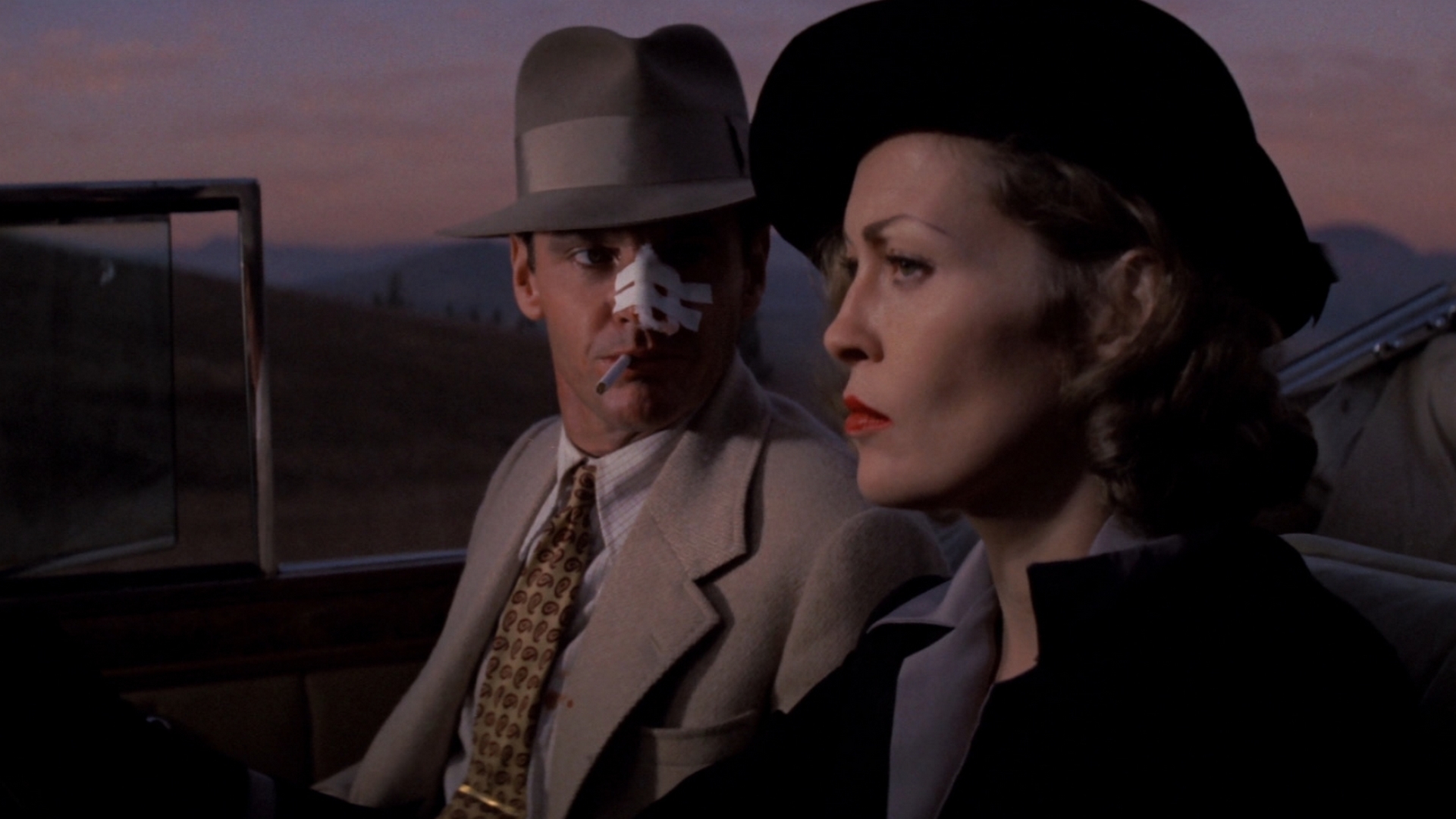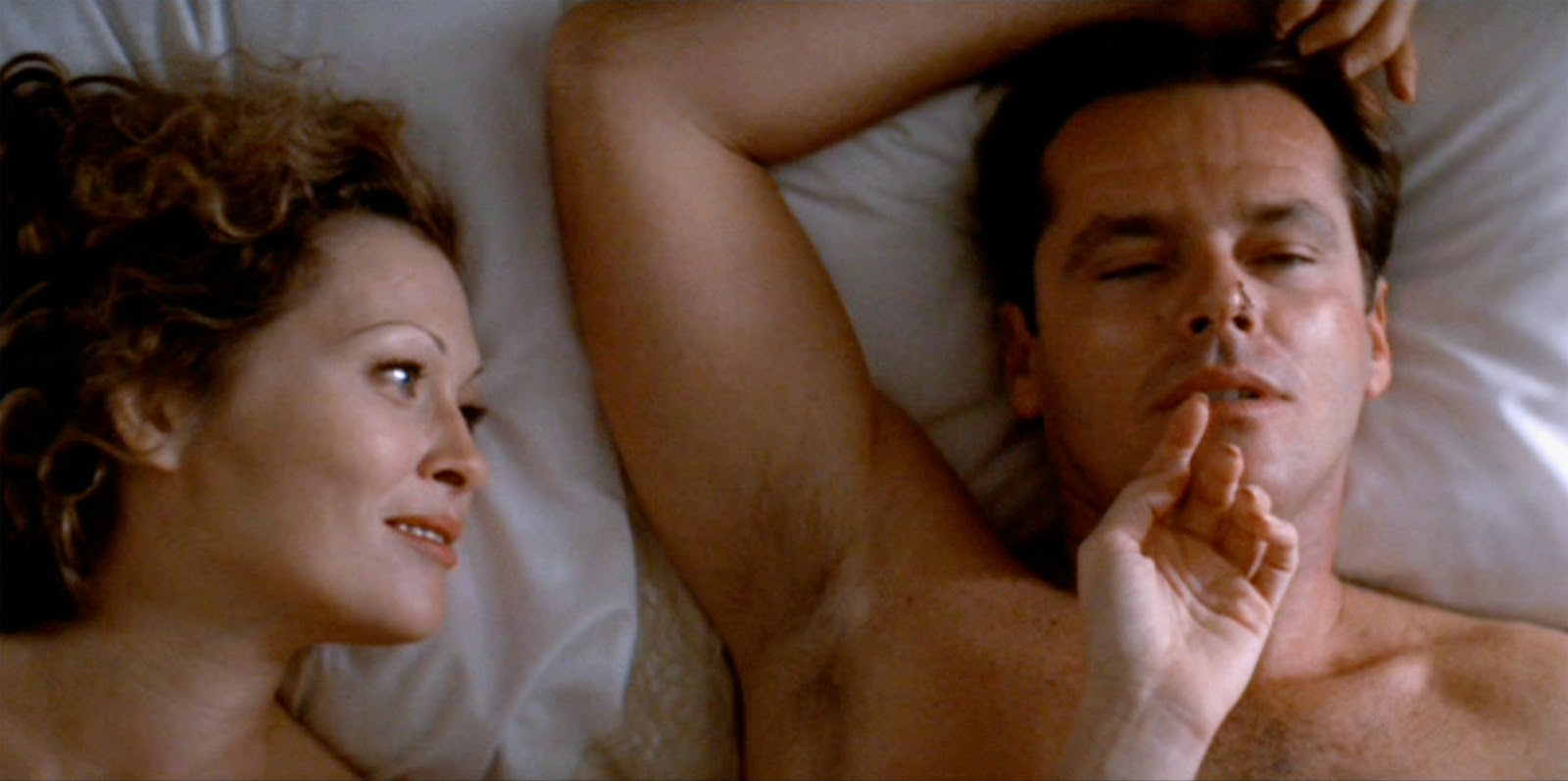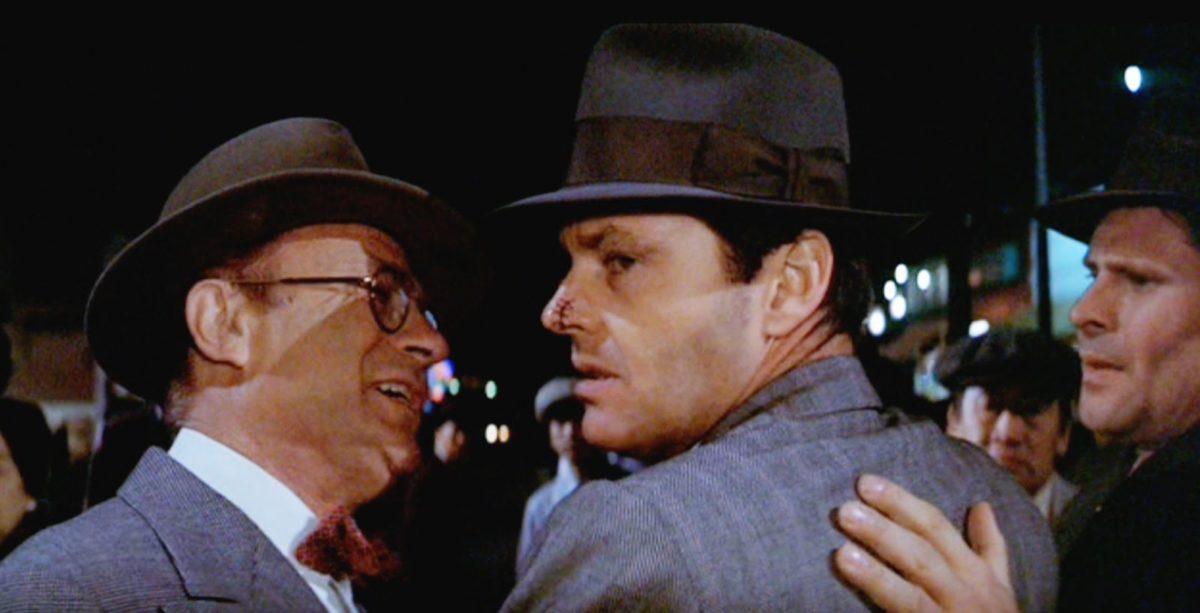Roger Ebert Original 1974 review:
Roger Ebert Great Movies Review – 2000:
Based on a script by Robert Towne, directed by Roman Polanski, and starring Jack Nicholson, 1974’s Chinatown takes place in 1930s Los Angeles. Private Investigator Jake Gittes (Jack Nicholson) is hired by a woman who claims that her name is Evelyn Mulwray. She wants Gittes to follow her husband, Hollis, and discover whether he’s having an affair. Gittes gets some pictures of Hollis with a young woman and hands them over to Evelyn. The next day, the pictures are published on the front page of the newspaper and Gittes is confronted by another woman (Faye Dunaway) who explains that she — and not the woman who hired him — is the actual Evelyn Mulwray. Gittes then learns that Hollis has turned up dead, drowned in a reservoir.
 Gittes suspects that Hollis was murdered and launches his own investigation. This eventually leads Jake to Hollis’s former business partner, Noah Cross (John Huston). Noah also happens to be the father of Evelyn and he offers double Gittes’ fee if Gittes will track down Hollis’s younger girlfriend. As his investigation continues, Gittes discovers that Hollis’ murder was connected to both the continued growth of Los Angeles as a city and a truly unspeakable act that occurred several years in the past. Nobody, it turns out, is what he or she originally appears to be. I really can’t say anything more without spoiling the film for those who haven’t seen it before.
Gittes suspects that Hollis was murdered and launches his own investigation. This eventually leads Jake to Hollis’s former business partner, Noah Cross (John Huston). Noah also happens to be the father of Evelyn and he offers double Gittes’ fee if Gittes will track down Hollis’s younger girlfriend. As his investigation continues, Gittes discovers that Hollis’ murder was connected to both the continued growth of Los Angeles as a city and a truly unspeakable act that occurred several years in the past. Nobody, it turns out, is what he or she originally appears to be. I really can’t say anything more without spoiling the film for those who haven’t seen it before.
At its heart, Chinatown is an homage to the old film-noirs of the 40s and 50s. Film-noir is a style of film more than a genre. It is difficult to define because there are elements that are common but not universal in these films which seem to be low-key lighting, hardboiled cynical leading men, and morally ambiguous themes. Film noir truly began with John Huston’s The Maltese Falcon, in 1941. It was the film that created a whole new genre; menacing situations, cigarettes, darkness and shadows, priceless objects, guns, femmes fatales, betrayal and murder all formed part of film noir. Then came magnificent pieces of work such as The Third Man, Sunset Boulevard, Touch of Evil, and The Big Sleep, which not only were masterpieces by their own right, but also helped in constructing and expanding film noir with admirable delicacy. Chinatown has all of the familiar elements: the hero is a private investigator, Evelyn Mulwray appears to be a classic femme fatale, the dialogue is appropriately cynical, and the plot is full of twist and turns.
Even the film’s theme of political conspiracy serves to remind us that most noirs used their detective stories as a way to explore the hidden underbelly of American society. However, despite the well-known subject matter, with Chinatown, Director Roman Polanski, Screenwriter Robert Towne, and Producer Robert Evans took all of those familiar elements and used them to create one of the greatest films ever made.
Chinatown, which was released in 1974, did not just do what these earlier films did, it did much more. Not only did it completely push the boundaries by carrying film-noir to another frontier; it took risks, and plenty of them. Some of the credit has to go to Jack Nicholson who, in the role of Jake Gittes, gives one of his best performances. Gittes is, in many ways, a stock character but Nicholson brings so much nuance and depth to the role that it doesn’t matter. Nicholson’s trademark cynicism and sarcasm are both to be found here but he also brings a cocky recklessness to the role. Gittes is such a charismatic and likable hero and so confident in himself that it makes the film’s ending all the more shocking.
As good as Nicholson is, he’s matched at every turn by John Huston’s Noah Cross. Yes, that is the same Huston that was one of the pioneers of the film-noir style. Noah Cross is one of the most vile characters to ever appear on-screen, which is why Huston’s courtly performance is all the more disturbing. When Gittes confronts Noah about the worst of his many crimes, Cross simply responds that a man is never sure what he’s capable of until he does it. Huston delivery of the lines leave us with little doubt that Noah believes every word of what he’s just said.
 In the end, though, most of the credit has to go to Roman Polanski’s direction and Robert Towne’s script. Towne’s script provided the only Oscar win despite the film’s 11 nominations. It provides a genuinely challenging and thought-provoking mystery, while Polanski’s stylish direction keeps the view continually off-balance and unsure of who is telling the truth. Reportedly, Polanski and Towne had a contentious relationship, with Polanski changing the ending of Towne’s script to make the film much more downbeat. In the end, I believe that everyone should experience this film. Don’t expect it to be a martial-arts film based on the title, and though it is humorous in places, don’t expect to leave the experience in a lightened mood. This is a gritty crime drama and as I watched the credits for the first time I felt as helpless as the characters on the screen and the film’s tone stayed with me for a few days as I pondered the plot, characters, and theme. And even after repeated viewings I believe that Polanski ended the film in the only way that is consistent with the film up to that point.
In the end, though, most of the credit has to go to Roman Polanski’s direction and Robert Towne’s script. Towne’s script provided the only Oscar win despite the film’s 11 nominations. It provides a genuinely challenging and thought-provoking mystery, while Polanski’s stylish direction keeps the view continually off-balance and unsure of who is telling the truth. Reportedly, Polanski and Towne had a contentious relationship, with Polanski changing the ending of Towne’s script to make the film much more downbeat. In the end, I believe that everyone should experience this film. Don’t expect it to be a martial-arts film based on the title, and though it is humorous in places, don’t expect to leave the experience in a lightened mood. This is a gritty crime drama and as I watched the credits for the first time I felt as helpless as the characters on the screen and the film’s tone stayed with me for a few days as I pondered the plot, characters, and theme. And even after repeated viewings I believe that Polanski ended the film in the only way that is consistent with the film up to that point.
In a masterful use of foreshadowing, one scene finds our two leading characters naked in bed leisurely smoking cigarettes. Wanting to know more about Jake’s past, Mrs. Mulwray finds that he is reluctant to speak about his past in Chinatown – where “you can’t always tell what’s going on.” But he finally reveals to her that with good intentions, he had tried to prevent something terrible from happening there to a woman he cared for, only to hasten the tragedy. This caused him to quit the police force and his life was changed forever. This is the clearest statement of the film’s theme, and we learn that Chinatown is more a state of mind than a location. In the final minutes of the film, we return to Chinatown with Jake struggling to tie up the loose ends of a messy situation, and ultimately we are left quoting the famous line along with Jake’s detective partner, “Forget it Jake. It’s Chinatown.”
